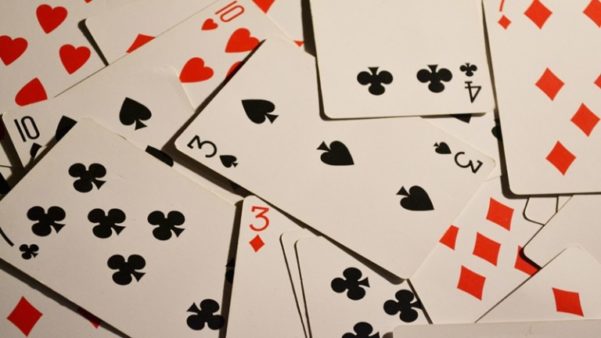Gentlemen, Place Your Bets
Marian Evans, American Renaissance, March 1994

Image credit: Khancs12/Wikimedia
For decades, American Indians have lived in greater misery than any other group in the country. Only 43 percent graduate from high school, 45 percent live in poverty, and 35 percent are unemployed. On some reservations, more than 80 percent are unemployed. Indians have the highest rates of alcoholism in the world, and 25 percent of Indian boys are problem drinkers by age eighteen.
A large part of the problem is that Indians were the first welfare recipients. The Bureau of Indian Affairs spends about $1.4 billion every year on reservations that are “sovereign nations” and do not pay taxes. In the last several years, however, Indians have stumbled upon an even more lucrative form of unearned income: gambling.
In 1988, Congress passed the Indian Gaming Regulatory Act, which requires all states to permit Indian reservations to engage in commercial versions of all forms of gambling allowed in the state. This means that if, ordinarily, only churches or schools are permitted to hold fund-raising “casino nights,” Indian tribes can operate real, Las Vegas-style gambling palaces.
Since the tribes do not know how to run the operations, they hire professional gambling companies like Harrah’s and Mirage Resorts to do the work. In many cases, they have no competitors within the state or even the region, and palefaces from the surrounding area are eager customers.
Twenty-one states now have legal, reservation gambling, and the annual take is about $15 billion a year, or three times as much money as the country spent in movie theaters. Although this is still only a small part of the $300 billion Americans bet legally in 1992, Indian gambling is growing at a rate of about $1 billion a year. Since profits on reservation casinos are not taxed, tribal gambling is immensely profitable. In states like New Jersey and Nevada, which have well-established commercial gambling, Indians can lure customers by offering better payouts.
Minnesota, with 17 Indian casinos, is now the third largest gambling state in the country, after Nevada and New Jersey. Indian gaming employs 10,000 people and is the seventh largest employer in the state. The small Mystic Lake reservation of the Shakopee Medwakantons has a 135,000 square-foot casino that is larger than anything in the Donald Trump empire. Since the casino opened in 1992, the reservation has bought land and more than doubled its size to 600 acres. Millions of dollars have gone into new roads, water and sewer systems, and a tribal courthouse. A $7 million recreation center is under construction, and a tribal credit union is expected soon.
Tribe members who live on the reservation are considered shareholders in the casino and get more than $4,000 a month each. Long lost Medwakantons are moving back to the reservation for a cut of the swag. Dividend income is a big change for a reservation whose previous major industries were incinerating discarded tires and salvaging copper from utility wires.
The per capita profits have not been so great for more populous tribes, but gambling is still a windfall. The Sycuan tribe of southern California took in $80 million in 1992 from gambling and bought medical and life insurance for all its members. At the Turtle Lake, Wisconsin reservation of the St. Croix Chippewa, gambling has paid off the tribe’s debt, built roads and homes, and now funds quarterly payments of $1,300 per tribe member.
The switch from incinerating tires to operating casinos has not always been smooth. In 1991, a fierce dispute erupted among the Wisconsin Winnebago over tribal debt and gambling revenues. For several months, the Winnebago even had a rival tribal government-in-exile, and the feud culminated in several killings at a casino and an attempt to burn it down. Gambling is now back on track, though a score of high Winnebago officials were recently accused of accepting bribes from casino operators.
The Indian gambling boom could end as quickly as it began. Donald Trump’s company is suing in federal court to have the Indian gaming law declared unconstitutional. The National Governors’ Association has woken up to the fact that the law forces states, even against their wills, to permit casino gambling within their borders. The association now urges that the law be repealed.
At the heart of the problem, of course, is our nation’s deep confusion over its racial, cultural, and national identity. Any government that thinks a 600-acre pocket of Indians is a “sovereign nation,” is scarcely fit to govern.















